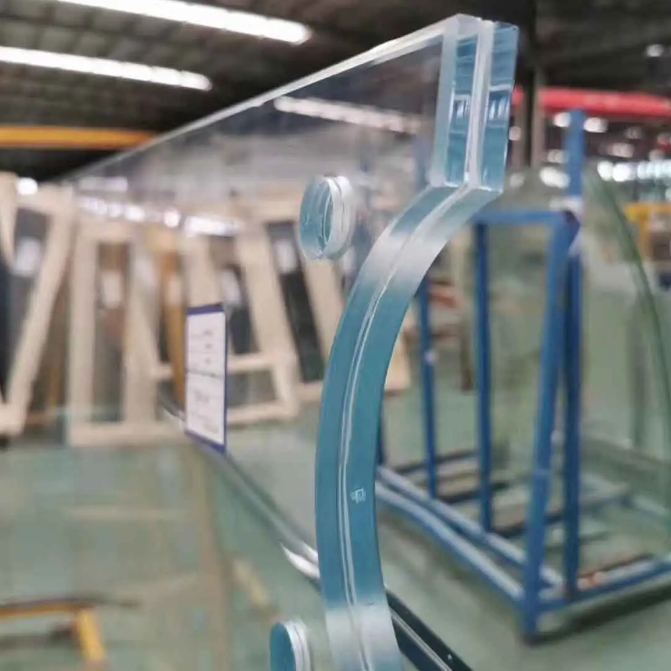
As the demand for safety, durability, and aesthetic appeal in architectural glass rises, selecting the right type of interlayer becomes crucial. SGP (SentryGlas® Plus) and PVB (Polyvinyl Butyral) are two prominent interlayer options used in laminated glass. Both offer distinct features and benefits, making them suitable for various applications. In this article, we will explore the differences between SGP glass and pvb laminated glass specification in terms of thickness, materials, advantages, and applications.

Thickness is one of the critical factors that differentiate SGP glass from PVB glass. PVB interlayers typically range in thickness from 0.38 mm (15 mil) to 1.52 mm (60 mil). This range provides flexibility for various architectural and safety requirements, from standard windows to more robust, impact-resistant applications.
On the other hand, the sgp lamination glass china made interlayers are generally available in a single thickness of 1.52 mm. While this might appear limiting at first glance, the uniform thickness of SGP interlayers is a testament to their superior mechanical properties. SGP's increased stiffness and strength make it effective in thinner configurations compared to PVB.
The core material significantly influences the performance characteristics of laminated glass. PVB is a resin made from polyvinyl butyral, providing excellent adhesion to the glass, impact resistance, and optical clarity. It is well-suited for standard safety glass applications, primarily due to its flexibility and ability to absorb impact energy.
SGP, or SentryGlas® Plus, is an ionoplast interlayer produced by chemically strengthening polymer sheets. This ionoplast technology results in a material that is up to 100 times stiffer and five times tougher than standard PVB. The remarkable stiffness of SGP interlayers enhances the structural integrity of the glass, making it less prone to deformation under stress.
Both SGP and PVB offer distinct advantages tailored to specific needs and applications:
- PVB Advantages:
- Cost-Effective: PVB is generally more affordable than SGP, making it an attractive option for budget-conscious projects.
- Flexibility: Due to its flexibility and impact absorption capacity, PVB offers excellent performance in applications demanding high safety and security.
- Acoustic Insulation: PVB interlayers provide superior sound dampening, making them ideal for windows in noise-sensitive environments like schools and residential areas.
- SGP Advantages:
- Enhanced Durability: SGP interlayers are significantly stiffer and tougher. This property enables them to retain structural integrity even after glass breakage, making them suitable for high-impact applications such as hurricane-prone regions.
- Thin but Strong: The increased strength of SGP allows for thinner glass configurations without compromising on safety and performance.
- Temperature and Moisture Resistance: SGP interlayers exhibit better performance in extreme temperatures and humid conditions, reducing the risk of delamination.
- Greater Transparency: The optical clarity of SGP interlayers remains superior over the long term, ensuring a more transparent and aesthetically pleasing facade.
The choice between SGP and PVB often depends on the specific application and its performance requirements. Here's a look at where each type excels:
- PVB Applications:
- Automotive Glass: PVB is widely used in automobile windshields due to its excellent adhesion and impact resistance.
- Residential Buildings: The acoustic insulation properties make PVB an excellent choice for residential glazing to reduce noise pollution.
- Standard Architectural Glazing: For general safety applications like windows, doors, and skylights, PVB offers adequate performance at a lower cost.
- SGP Applications:
- Structural Glazing: SGP glass is ideal for structural applications such as facades, curtain walls, and high-performance glazing systems where additional strength and stiffness are critical.
- Hurricane and Impact-Resistant Glass: In regions prone to hurricanes or seismic activity, SGP's superior impact resistance ensures greater safety.
- Glass Floors, Stairs, and Balustrades: The mechanical properties of SGP make it well-suited for load-bearing applications, adding an element of safety and strength without compromising on aesthetics.
- Large Span Glazing: For expansive glass walls and facades, SGP interlayers help maintain structural integrity and stability.
Evergreen Glass, a leading vacuum glass factory in China, specializes in both PVB and SGP laminated glass. Their expertise in sgp lamination ensures that clients receive the highest quality products tailored to their specific needs. By leveraging advanced manufacturing techniques and stringent quality control, Evergreen Glass delivers solutions that enhance safety, aesthetics, and performance.
Both SGP and PVB glass offer unique advantages, suited for different applications and requirements. While PVB is flexible, cost-effective, and great for acoustic insulation, SGP stands out with its exceptional strength, durability, and performance in demanding conditions. Choosing the right interlayer depends on the specific needs of each project, and brands like Evergreen Glass make the selection process easier by offering high-quality options in both categories.